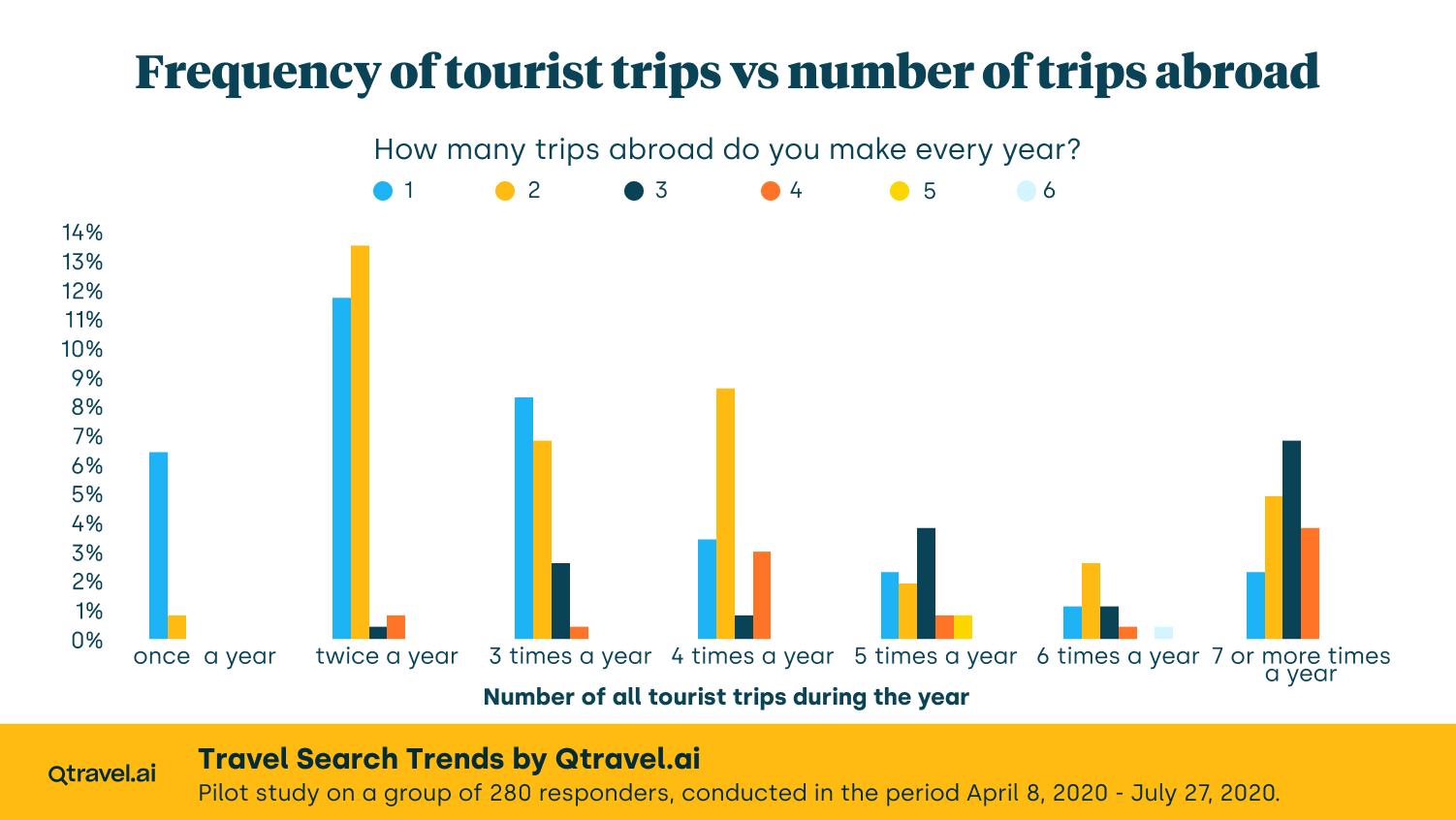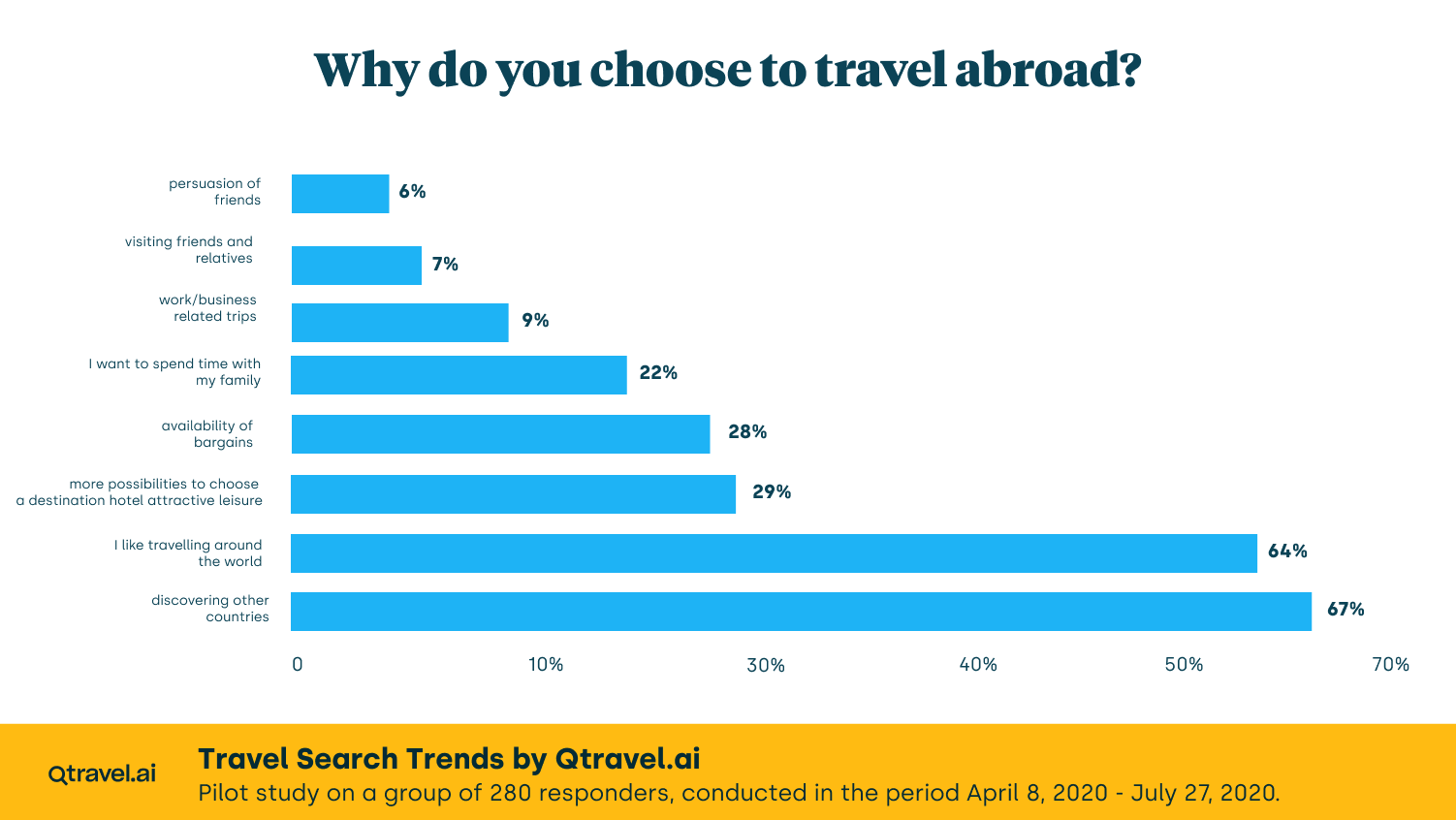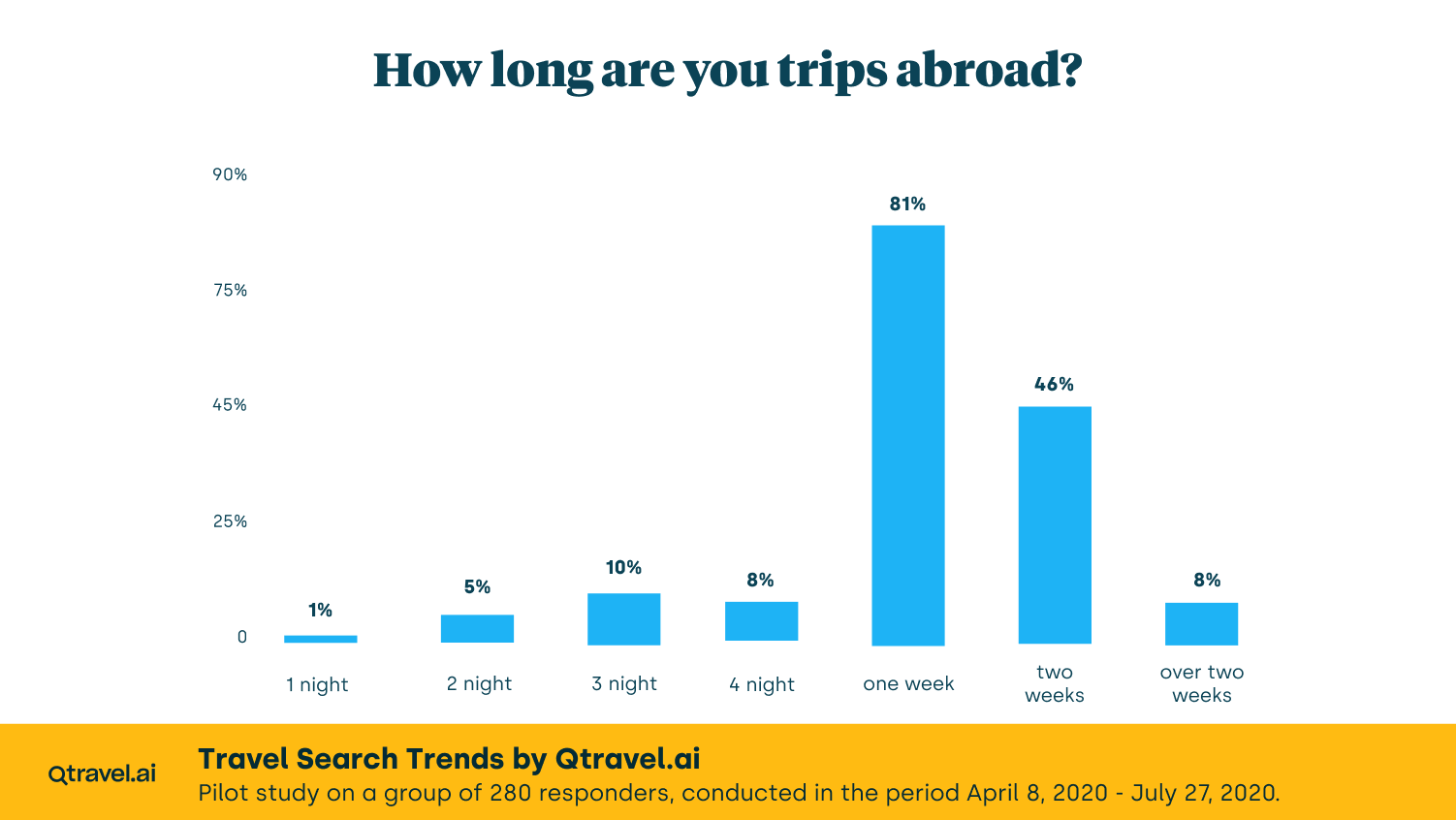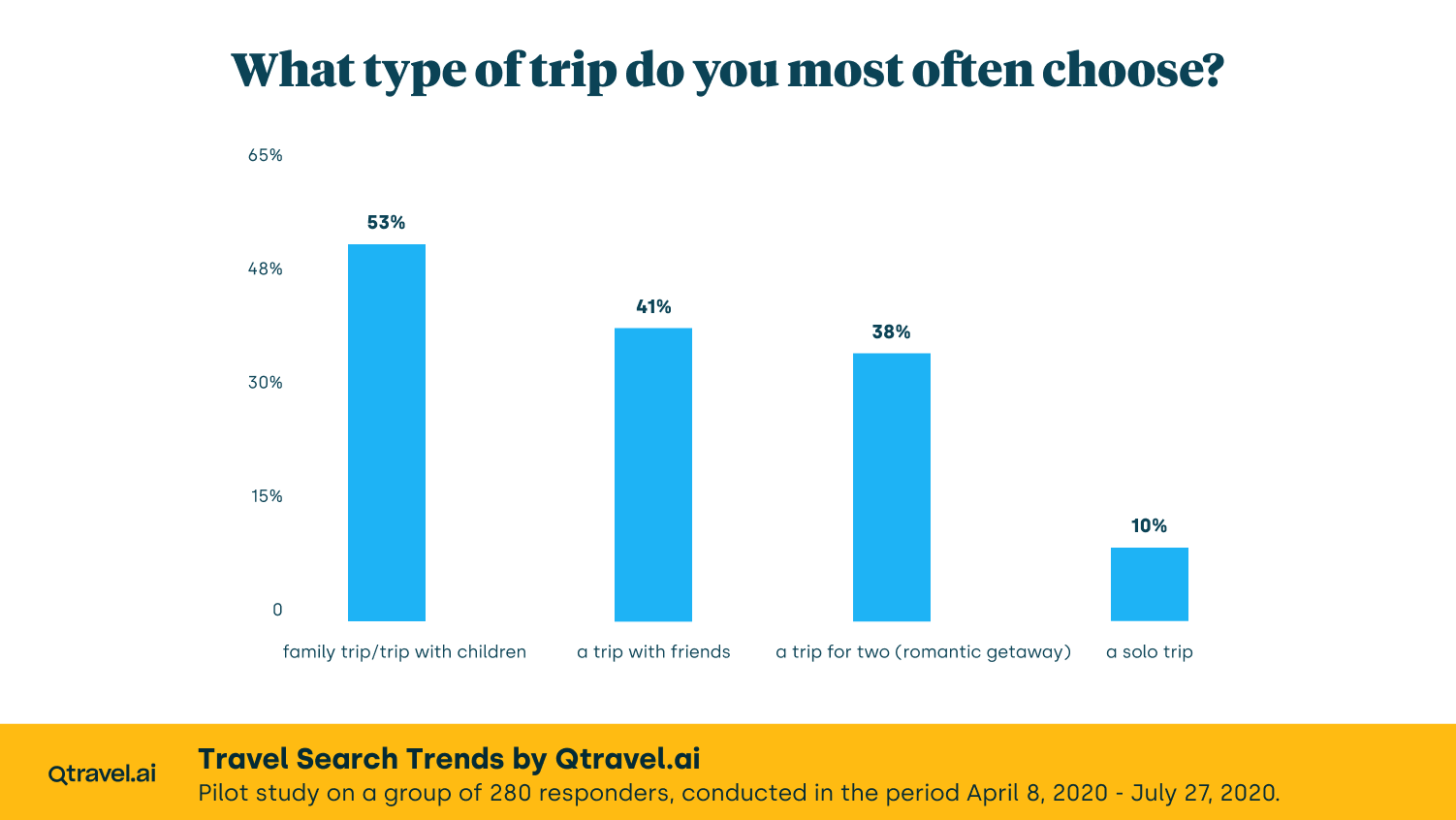In the next few parts of the series we will be looking at the characteristics of Poles’ travels abroad. The basis for this analysis is constituted by the results of the study described in Travel Search Trends 2020. Part 1 – characteristics of the respondents conducted on a group of respondents by Qtravel. It was a pilot study, the results of which cannot be applied generally to the entire population (it included mainly people who used the services of online travel agencies). However, given the systematically growing group of tourists who use OTA services (on-line travel agencies), the trends that characterise this form of shopping can be considered as a manifestation of transformations that are permanently taking place in tourism and the demand for it.
The extensive survey questionnaire included questions about the number and duration of trips abroad, the reasons for choosing a trip abroad, the types of such trips (including the type of accompanying group), the choice of means of transport and types of accommodation, as well as the criteria for selecting destinations of such trips (here particularly interesting changes refer to security issues, to which Poles paid somewhat less attention in past years than at present). Another interesting observation is the time when Poles start looking for information and inspiration for their planned holiday trips, and how soon in advance they actually make their bookings. Other interesting issues include the preferred sources of this information, the most important criteria taken into account when planning a trip abroad, and last but not least, the sources of greatest frustrations related to planning a holiday trip. The latter information seems to be particularly important in the context of improving the so-called User Experience, which at the stage of planning a tourist trip may determine the effectiveness of selling a tourist offer.
As announced in Travel Search Trends 2020. Part 3 – do we like long holiday stays in Poland?, we will start by analysing the length of holiday trips of Poles who travel abroad and try to correlate it with different variables.
The number of tourist trips taken annually is strongly related to the propensity to travel abroad. Two particularly interesting observations are worth noting here:
- The more times one travels annually, the more often a significant part of those trips (at least half) are trips abroad.
- The surprising observation is that among people who declare only one tourist trip per year, over 90% choose to go abroad (see Chart 1).

The most common reasons for travelling abroad (it was possible to select several answers) include the desire to visit foreign countries (this option was chosen by 67% of visitors) and the passion for travelling abroad (64% of respondents). The conviction that travelling abroad opens up greater possibilities in terms of the choice of destination, hotels, attractive forms of recreation – is shared by almost one third of respondents (29%). The number of travellers who decide to go abroad because of bargains (28% of respondents) and because they want to spend time with their families (22%) is similar. There is also a significant number of people who travel abroad to visit friends and relatives (9%). The least numerous were the groups of people who chose persuasion by friends (6%) or professional reasons (7%) as an impulse to go abroad.

Obviously, trips abroad are usually relatively long. The shortest stays are associated with business trips (1 or 2 nights), and this option was chosen by relatively few respondents (1% and 5% respectively). The most frequent choice in the case of foreign trips is a one-week long trip (81% of respondents) or a two-week long trip, chosen by almost half of the respondents. However, the number of people who choose to travel longer than two weeks is quite significant – the number of people who have indicated this option is comparable to tourists who spend 3 or 4 nights abroad.

As far as the two categories above are concerned (reasons for travelling abroad and length of stay when travelling abroad), there is actually a significant correlation between them for those who choose to travel abroad owing to the availability of bargains. 86% of price-driven respondents choose one-week long trips. Among people who choose two-week long stays, on the other hand, dominant were those respondents who indicated a desire to spend time with their families as the main reason for travelling (67%).
Family trips (53%) and trips with friends (41%) remain the most popular trip types when travelling abroad. Family trips were most often indicated by respondents who go away for a week or two weeks, which is understandable as a trip with children is always a bigger logistical undertaking and thus makes little sense with short stays. Respondents who indicated a ‘trip for two/romantic getaway’ option also constituted a significant group (38%). A much smaller group of respondents (10%) indicated the option ‘solo trip’, but this still remains a significant percentage. What is more, in this group the decision about long stays (which exceed two weeks) was made more often than in the case of other types of trips – as many as half of those who travel solo stay on such a trip for more than two weeks.

Those who indicated trips with friends as their preferred choice, selected both one-week (23%) and two-week long stays (36%), as well as short trips of less than 2-3 nights (39% and 56% respectively). This group most likely included persons who make use of the so-called city-breaks, increasingly popular among young Poles, but still rarely offered with regard to Polish cities. With the availability of cheap airlines and the popularity of packages that include flight and accommodation in attractive tourist cities, such places as Berlin, Prague, Munich, Vienna, or even Rome, Paris and London are becoming the destination of short trips abroad for young Poles.
Trips for two are equally often short (3-4 nights) and long (2 weeks) – the percentage of indications in both cases amounted to 36% and 39% respectively.
Both trips for two and short trips with friends are more strongly correlated with the search for bargains than family trips. As many as 34% of respondents who organise a trip for two and as many as 41% of those who travel with friends indicated that bargain prices were an impulse behind the decision to travel abroad. In the group of tourists who plan a family trip, the availability of bargains is important to 24% of respondents, which still represents almost a quarter of all who were surveyed. However, it should be recognised that a trip with children is more likely be organised regardless of the availability of discounts or last minute options.
It is worth adding that the survey conducted by Qtravel in 2020, practically at the very beginning of the pandemic, could not take into account the events that have accompanied us over the past year: successive waves of infections and the almost complete closure of the tourism industry practically all over the world. Therefore, in addition to the results of the study presented here, it is worth supplementing this analysis with the findings of researchers from other institutions. The findings show that as many as 63.5% of Poles take into account the fact that owing to the coronavirus pandemic they will have to cancel their summer holiday plans at the last minute. At the same time, the juxtaposition of plans for this year’s holiday with holiday activities in 2019 shows that the pandemic has had an impact on the shortening of holiday trip duration.[1] Nearly half of the respondents feel that in the coming season, owing to the epidemic, they are more likely to decide on a spontaneous trip for a few days, at the expense of a longer holiday planned in advance.
Despite this, 41.3% of respondents declare that they will spend this year’s holiday in Poland, and almost 25% plan to go abroad, which indicates that the proportions of how Poles travelled in past years have been maintained. On the other hand, there is a significant percentage of people who intend to spend their holidays in their place of residence or in its vicinity, despite the fact that they have actively participated in holiday trips every year (almost 16% of respondents). It is probably not surprising that owing to the frequently changing restrictions, many people intend to make a decision about their holiday trip only at the last minute.
We will continue the theme of holiday trips abroad in the subsequent parts of the series, because in the era of the pandemic, but also owing to the growing awareness of personal safety, the issues of the criteria for selecting destinations of holiday travels, as well as the preferred means of transport and accommodation will be of interest.
We encourage you to read the rest of the articles in this series:
- Part 1: Profile of the respondents.
- Part 2: How often do tourists travel during the year?
- Part 3: Do we like long holiday stays in Poland?
- Part 4: Poles travelling abroad part 1.
- Part 5: Poles travelling abroad part 2.
- Part 6: How far in advance do we plan tourist trips?
- Part 7: How far in advance do we plan tourist trips? – the income factor.
- Part 8: Flexibility in holiday travel planning.
- Part 9: Frequency of travel versus flexibility in travel planning.
- Part 10: Gender versus flexibility in travel planning.
